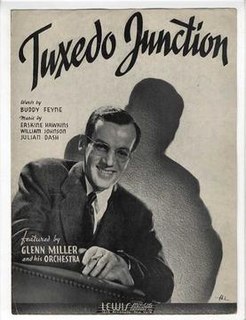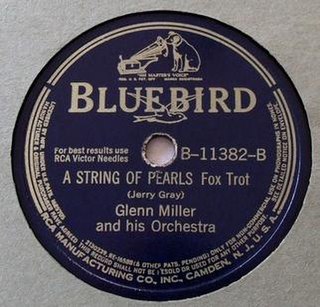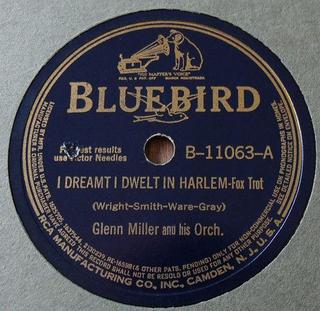Personnel
The personnel for the April 4, 1939 "Moonlight Serenade" recording session in New York consisted of: Bob Price, Legh Knowles, Dale McMickle, on trumpet; Glenn Miller, Al Mastren, Paul Tanner, on trombone; Wilbur Schwartz, on clarinet and alto saxophone; Hal McIntyre, on alto saxophone; Stanley Aronson, on alto and baritone saxophone; Tex Beneke, Al Klink, on tenor saxophone; Chummy MacGregor, on piano; Allen Reuss, on guitar; Rowland "Rolly" Bundock, on string bass; and Frank Carlson, on drums. [6]
The personnel for "American Patrol": Saxes: Tex Beneke, Wilbur Schwartz, Ernie Caceres, Al Klink, Lloyd "Skip" Martin; Trumpets: John Best, R. D. McMickle, Billy May, Steve Lipkins; Trombones: Glenn Miller, Jimmy Priddy, Paul Tanner, Frank D'Annolfo; Piano: Chummy MacGregor; String Bass: Edward "Doc" Goldberg; Guitar: Bobby Hackett; Drums: Moe Purtill.
The personnel for "Song of the Volga Boatmen": Saxes: Hal McIntyre, Tex Beneke, Wilbur Schwartz, Ernie Caceres, Al Klink; Trumpets: John Best, R. D. McMickle, Billy May, Ray Anthony; Trombones: Glenn Miller, Jimmy Priddy, Paul Tanner, Frank D'Annolfo; Piano: Chummy MacGregor; String Bass: Herman "Trigger" Alpert; Guitar: Jack Lathrop; Drums: Moe Purtill.
The personnel for "Tuxedo Junction": Saxes: Hal McIntyre, Tex Beneke, Wilbur Schwartz, Jimmy Abato, Al Klink; Trumpets: Clyde Hurley, John Best, R. D. McMickle, Legh Knowles; Trombones: Glenn Miller, Tommy Mack, Paul Tanner, Frank D'Annolfo; Piano: Chummy MacGregor; String Bass: Rowland Bundock; Guitar: Richard Fisher; Drums: Moe Purtill.
The personnel for "In the Mood": Saxes: Hal McIntyre, Tex Beneke, Wilbur Schwartz, Harold Tennyson, Al Klink; Trumpets: Clyde Hurley, R. D. McMickle, Legh Knowles; Trombones: Glenn Miller, Paul Tanner, Al Mastren; Piano: Chummy MacGregor; String Bass: Rowland Bundock; Guitar: Richard Fisher; Drums: Moe Purtill.
The personnel for "Little Brown Jug": Saxes: Hal McIntyre, Tex Beneke, Wilbur Schwartz, Stanley Aronson, Al Klink; Trumpets: Bob Price, R. D. McMickle, Legh Knowles; Trombones: Glenn Miller, Paul Tanner, Al Mastren; Piano: Chummy MacGregor; String Bass: Rowland Bundock; Guitar: Allen Reuss; Drums: Moe Purtill.
The personnel for "Stardust": Saxes: Hal McIntyre, Tex Beneke, Wilbur Schwartz, Jimmy Abato, Al Klink; Trumpets: Clyde Hurley, John Best, R. D. McMickle, Legh Knowles; Trombones: Glenn Miller, Howard Gibeling, Paul Tanner, Frank D'Annolfo; Piano: Chummy MacGregor; String Bass: Rowland Bundock; Guitar: Richard Fisher; Drums: Moe Purtill.
The personnel for "Pennsylvania Six-Five Thousand": Saxes: Hal McIntyre, Tex Beneke, Wilbur Schwartz, Ernie Caceres, Al Klink; Trumpets: John Best, R. D. McMickle, Clyde Hurley, Legh Knowles; Trombones: Glenn Miller, Jimmy Priddy, Paul Tanner, Frank D'Annolfo; Piano: Chummy MacGregor; String Bass: Herman "Trigger" Alpert; Guitar: Jack Lathrop; Drums: Moe Purtill.




















